At present I'm getting errors about how it can't find one of my includes, specifically
java.lang.ClassNotFoundException: org.jivesoftware.smack.provider.ProviderManager
I have confirmed the file to be running as an executable jar, so I really don't know why it would error out like this, can someone provide me with some insight?
Here's what I'm currently doing, please correct me if any step of this is wrong.
I take my (confirmed working) program, run it to double check.
I right click the project > Export > Runnable jar file and Select the options > Package required libraries into generated jar file and export Ant Build script to file myProg.xml
When myprog.xml comes out, it looks like this:
<?xml version="1.0" encoding="UTF-8" standalone="no"?> <project default="create_run_jar" name="Create Runnable Jar for Project myProg with Jar-in-Jar Loader"> <!--this file was created by Eclipse Runnable JAR Export Wizard--> <!--ANT 1.7 is required --> <target name="create_run_jar"> <jar destfile="C:/Users/Dbell/Documents/EclipseProjects/myProg/myProg.jar"> <manifest> <attribute name="Main-Class" value="org.eclipse.jdt.internal.jarinjarloader.JarRsrcLoader"/> <attribute name="Rsrc-Main-Class" value="com.myCom.noc.xmpptroubleshooter.Main"/> <attribute name="Class-Path" value="."/> <attribute name="Rsrc-Class-Path" value="./ httpasyncclient-4.0-beta2.jar httpcore-4.2.1.jar httpcore-nio-4.2.1.jar httpclient-4.2.1.jar commons-logging-1.1.1.jar commons-codec-1.6.jar log4j-1.2.12.jar logkit-1.0.1.jar avalon-framework-4.1.3.jar servlet-api-2.3.jar commons-net-3.1.jar xpp3_min-1.1.4c.jar NocLib-1.1.jar smack32-3.2.0.jar httpclient-3.1.jar"/> </manifest> <zipfileset src="jar-in-jar-loader.zip"/> <fileset dir="C:/Users/Dbell/Documents/EclipseProjects/myProg/bin"/> <zipfileset dir="C:\Users\Dbell\.ivy2\cache\org.apache.httpcomponents\httpasyncclient\jars" includes="httpasyncclient-4.0-beta2.jar"/> <zipfileset dir="C:\Users\Dbell\.ivy2\cache\org.apache.httpcomponents\httpcore\jars" includes="httpcore-4.2.1.jar"/> <zipfileset dir="C:\Users\Dbell\.ivy2\cache\org.apache.httpcomponents\httpcore-nio\jars" includes="httpcore-nio-4.2.1.jar"/> <zipfileset dir="C:\Users\Dbell\.ivy2\cache\org.apache.httpcomponents\httpclient\jars" includes="httpclient-4.2.1.jar"/> <zipfileset dir="C:\Users\Dbell\.ivy2\cache\commons-logging\commons-logging\jars" includes="commons-logging-1.1.1.jar"/> <zipfileset dir="C:\Users\Dbell\.ivy2\cache\commons-codec\commons-codec\jars" includes="commons-codec-1.6.jar"/> <zipfileset dir="C:\Users\Dbell\.ivy2\cache\log4j\log4j\jars" includes="log4j-1.2.12.jar"/> <zipfileset dir="C:\Users\Dbell\.ivy2\cache\logkit\logkit\jars" includes="logkit-1.0.1.jar"/> <zipfileset dir="C:\Users\Dbell\.ivy2\cache\avalon-framework\avalon-framework\jars" includes="avalon-framework-4.1.3.jar"/> <zipfileset dir="C:\Users\Dbell\.ivy2\cache\javax.servlet\servlet-api\jars" includes="servlet-api-2.3.jar"/> <zipfileset dir="C:\Users\Dbell\.ivy2\cache\commons-net\commons-net\jars" includes="commons-net-3.1.jar"/> <zipfileset dir="C:\Users\Dbell\.ivy2\cache\xpp3\xpp3_min\jars" includes="xpp3_min-1.1.4c.jar"/> <zipfileset dir="C:\Users\Dbell\.ivy2\cache\com.MyCom\NocLib\jars" includes="NocLib-1.1.jar"/> <zipfileset dir="C:\Users\Dbell\.ivy2\cache\com.MyCom\smack32\jars" includes="smack32-3.2.0.jar"/> <zipfileset dir="C:\Users\Dbell\.ivy2\cache\com.apache\httpclient\jars" includes="httpclient-3.1.jar"/> </jar> <signjar jar="myProg.jar" alias="myAlias" keystore="path/to/myKs.ks" storepass="MyPass"/> </target> </project>From there I right click > run as > ant build file to sign my jar.
Then I move it to my webserver where a launch.jnlp file exists. That looks like this:
<?xml version="1.0" encoding="UTF-8" standalone="no"?> <jnlp codebase="http://myServer:8080/myProg/" href="http://myServer:8080/myProg/launch.jnlp" spec="6.0+"> <information> <title>myProg</title> <vendor>myName</vendor> <homepage href="http://myServer:8080/myProg/"/> <description>myProg</description> <description kind="short">myProg</description> </information> <security> <all-permissions/> </security> <resources> <j2se version="1.6+" /> <jar href="myProg.jar" main="true"/> </resources> <application-desc main-class="com.myCom.noc.pathToMain.Main"> </application-desc> </jnlp>
Full stack trace from when application is launched:
java.lang.ClassNotFoundException: org.jivesoftware.smack.provider.ProviderManager
at java.net.URLClassLoader$1.run(Unknown Source)
at java.net.URLClassLoader$1.run(Unknown Source)
at java.security.AccessController.doPrivileged(Native Method)
at java.net.URLClassLoader.findClass(Unknown Source)
at com.sun.jnlp.JNLPClassLoader.findClass(Unknown Source)
at java.lang.ClassLoader.loadClass(Unknown Source)
at java.lang.ClassLoader.loadClass(Unknown Source)
at com.myCom.noc.xmpptroubleshooter.Main.main(Main.java:83)
at sun.reflect.NativeMethodAccessorImpl.invoke0(Native Method)
at sun.reflect.NativeMethodAccessorImpl.invoke(Unknown Source)
at sun.reflect.DelegatingMethodAccessorImpl.invoke(Unknown Source)
at java.lang.reflect.Method.invoke(Unknown Source)
at com.sun.javaws.Launcher.executeApplication(Unknown Source)
at com.sun.javaws.Launcher.executeMainClass(Unknown Source)
at com.sun.javaws.Launcher.doLaunchApp(Unknown Source)
at com.sun.javaws.Launcher.run(Unknown Source)
at java.lang.Thread.run(Unknown Source)
And this is the inside of my jar
